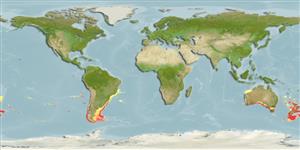>
Ophidiiformes (Cusk eels) >
Ophidiidae (Cusk-eels) > Ophidiinae
Etymology: Genypterus: Greek, geny, -yos = face, jaw + Greek, pteron, = wing, fin (Ref. 45335).
More on author: Forster.
Environment: milieu / climate zone / depth range / distribution range
Ecologie
marien bathydemersaal; oceanodroom (Ref. 51243); diepte 22 - 1000 m (Ref. 58489), usually 300 - 550 m (Ref. 6390). Deep-water; 17°S - 57°S, 114°E - 30°W (Ref. 34024)
Southwest Pacific: southern Australia and around New Zealand. Southeast Pacific: Chile (Ref. 9068). Southwest Atlantic: Brazil (Ref. 4517).
Lengte bij maturiteit / Grootte / Gewicht / Leeftijd
Maturity: Lm 72.0 range ? - ? cm
Max length : 200 cm SL mannelijk / geslacht onbekend; (Ref. 34024); common length : 100.0 cm TL mannelijk / geslacht onbekend; (Ref. 9258); max. gepubliceerd gewicht: 25.0 kg (Ref. 34024); max. gerapporteerde leeftijd: 46 Jaren (Ref. 128769)
Korte beschrijving
Determinatiesleutels | Morfologie | Morfometrie
Dorsale stekels (totaal) : 0; Dorsale zachte stralen (totaal) : 141 - 164; Anale stekels: 0; Anale zachte stralen: 101 - 126; Wervels: 68 - 70. Body pinkish yellow, marbled with irregular reddish brown blotches dorsally (Ref. 27363).
Common species (Ref. 34024). Found between depths of 22 m (Ref. 58489) and 1000 m (Ref. 33848). Feed mainly on crustaceans such as Munida and scampi and also on fish. Also caught above the bottom when feeding on hoki (Macruronus novaezelandiae) during the hoki spawning season. Available all year round. Juveniles are found in shallower shelf waters (Ref. 6390). Oviparous, with oval pelagic eggs floating in a gelatinous mass (Ref. 205). Utilized fresh, frozen or smoked; can be fried and baked (Ref. 9988, 34024).
Nielsen, J.G., D.M. Cohen, D.F. Markle and C.R. Robins, 1999. Ophidiiform fishes of the world (Order Ophidiiformes). An annotated and illustrated catalogue of pearlfishes, cusk-eels, brotulas and other ophidiiform fishes known to date. FAO Fish. Synop. 125(18):178p. Rome: FAO. (Ref. 34024)
Status op de Rode Lijst van het IUCN (Ref. 130435)
Gevaar voor de mens
Harmless
Gebruik door de mens
Visserij: van groot commercieel belang
Tools
Speciale rapporten
Download XML
Internetbronnen
Estimates based on models
Preferred temperature (Ref.
123201): 3.3 - 12.7, mean 7.2 °C (based on 279 cells).
Fylogenetische diversiteitsindex (Ref.
82804): PD
50 = 0.5156 [Uniqueness, from 0.5 = low to 2.0 = high].
Bayesian length-weight: a=0.00219 (0.00131 - 0.00366), b=3.17 (3.02 - 3.32), in cm total length, based on LWR estimates for this species & (Sub)family-body (Ref.
93245).
Trofisch niveau (Ref.
69278): 4.2 ±0.76 se; based on food items.
Generation time: 11.0 (8.6 - 12.6) years. Estimated as median ln(3)/K based on 10
growth studies.
Weerstandsvermogen (Ref.
120179): laag, minimale populatieverdubbelingstijd 4,5-14 jaar (K=0.1-0.23; tmax=30; tm=5-7).
Prior r = 0.25, 95% CL = 0.16 - 0.37, Based on 4 full stock assessments.
Fishing Vulnerability (Ref.
59153): Very high vulnerability (84 of 100).
Climate Vulnerability (Ref.
125649): Moderate vulnerability (44 of 100).
Nutrients (Ref.
124155): Calcium = 11.8 [7.2, 25.7] mg/100g; Iron = 0.365 [0.190, 0.713] mg/100g; Protein = 15.6 [13.6, 17.7] %; Omega3 = 0.255 [0.136, 0.502] g/100g; Selenium = 31.6 [14.3, 70.0] μg/100g; VitaminA = 6.94 [1.54, 32.25] μg/100g; Zinc = 0.234 [0.157, 0.351] mg/100g (wet weight); based on
nutrient studies.
